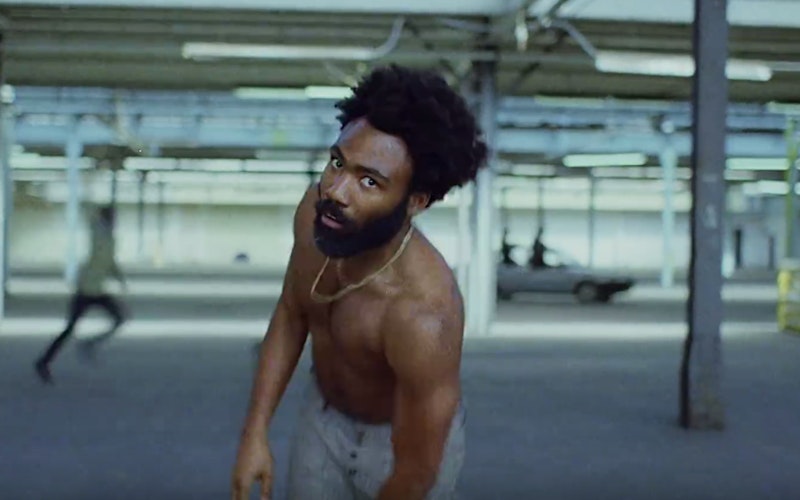
Music
This is America and Nehemiah
From the outset, “This Is America” is disorienting—a lighthearted dance party in the front, destruction and death in the back. Since its premiere earlier this month, the new video from rapper Childish Gambino (the stage name for actor-producer-writer-director Donald Glover) has had everyone talking about its commentary on the American fascination with guns and violence. But Glover is not just focused on American culture generally—he’s specifically concerned with how this fascination affects the lives of African-Americans. “This is America” asks us to take a long hard look at things many of us would prefer to ignore, including those of us in the church.
For most of the video, Glover performs many of today’s hottest dance moves while surrounded by young black teenagers. Repeatedly, the routines are interrupted with sudden bursts of gun violence. This juxtaposition captures the complexity and contradiction of African-American life. While black celebrities are often celebrated for their ability to entertain, lurking behind the dancing there is death and destruction that garners far less attention.
“This Is America” provides an opportunity for the church to examine our own hypocrisy in this matter. We are rightly concerned about abortion, but there is also a culture of death that seems acceptable only when African-American lives are involved. According to a recent New York Times article, black mothers are three to four times as likely to die from pregnancy-related causes than white mothers. The same article also points out that black infants are twice as likely to die as white babies. Children in Chicago have been advocating for gun-violence prevention for many years before the recent school shooting in Parkland, Fla., garnered national attention and an immediate response from state legislature. White mothers addicted to opioids are being met with kindness and services, whereas black mothers addicted to crack have been met with harsh criminal penalties.
“This is America” asks us to take a long hard look at things many of us would prefer to ignore, including those of us in the church.
In the Bible, Nehemiah returns to Jerusalem and finds the city wall in ruins and the people scattered. He laments the broken wall as he prays for God to intervene on behalf of the Jews. After his prayer, Nehemiah is moved to action. He uses his position and his influence with the king to get the materials needed to rebuild what has been broken. Nehemiah demonstrates that to be for something or someone means more than offering words of encouragement from a distance. Nehemiah moved near to the problem, he used his influence, he engaged local leaders, and most importantly he was a co-laborer in the work of rebuilding.
In “This is America,” there is a moment where a church choir happily sings as violence surrounds them. They do not step down from their perch and attempt to intervene. Then, shockingly, the violence comes to them. It feels as though many in the church are happy to ignore, minimize, or excuse the injustice, brokenness, hopelessness, and anger facing many African-Americans. In church conversations around racial reconciliation, often many only want more black and brown faces in the pews without any critical engagement of the realities of African-American life in the United States. We so often settle for superficial diversity, rather than being willing, as Nehemiah was, to do the tough work of rebuilding what has been broken. Often in the church we are more comfortable with the dancing in the foreground, readily accepting of the person who is willing to conceal their pain and entertain us. We are eager to have a black or brown face if they share the majority culture, ideology, and political leanings. And some minorities are perfectly willing to do the dance for the acceptance and access to power, book deals, and speaking engagements.
Occasionally, though, the violence that is in the background slips to the foreground. Yet even then, the murder only temporarily distracts from Glover’s dancing; there is always someone to quickly remove the bodies and the guns from our sight. Remember, though, there are children watching and recording every killing and every attack. While it may escape our sight, there are children being formed every day by the casual violence. When Nehemiah is told that the poor are being forced to sell their children because of the high costs associated with farming the land, he gathers the nobles and officials and rebukes them for their greed. For the sake of the next generation of Israelites, he intervened. Children are watching today, learning from us what we value. When we have the power to act and we choose to ignore, how can they know we value all God’s children?
“This is America” presents a choice—focus on the dancing in the foreground and ignore the suffering in the background or see them both and recognize that this America is not the one we want. May we, as Christians, dare to address the injustices of our day as Nehemiah did, so that we can rebuild our cities. In the book of Nehemiah, after the gates and walls have been rebuilt, all the returning exiles are gathered for an assembly. After a reading of the Book of the Law, Nehemiah shared words of encouragement that we can hope, one day, to also hear: “Go and enjoy choice food and sweet drinks and send some to those who have nothing prepared. This day is holy to our Lord. Do not grieve, for the joy of the Lord is your strength.”
The joy of the Lord gives us strength. Let us use it to help those who have nothing prepared—those trapped in the background in Childish Gambino’s America.
Topics: Music